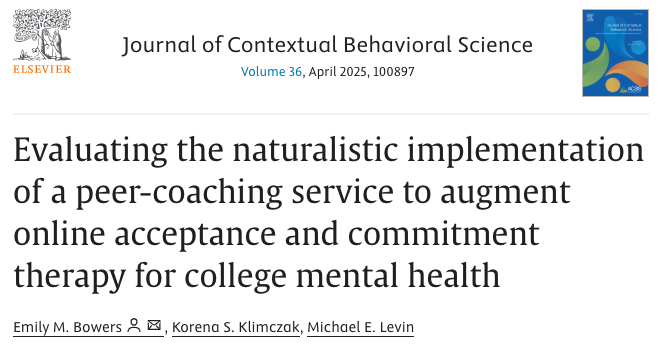Journal of Contextual Behavioral Science (JCBS)
Volume 36, April 2025
Authors
Emily M. Bowers, Korena S. Klimczak, Michael E. Levin
Key Findings
- Digit mental health intervention adherence is improved for a subset of users with a peer-coaching model.
- Older and more anxious users are more likely to engage in peer-coaching.
- Adherence to peer-coaching phone calls is low when implemented in a naturalistic setting.
- Training and retaining peer coaches highlight challenges for scalability.
Abstract
Digital Mental Health Interventions (DMHIs) offer accessible and scalable mental health services for college students; however, program adherence is often suboptimal. Peer-delivered coaching is an innovative solution to improve DMHI adherence rates but has yet to be examined in a naturalistic setting to assess implementation and scalability when provided as a public service. To test the external validity of peer-support coaching, we collected data from a naturalistic university sample of students using a free online self-help program, Acceptance and Commitment Therapy (ACT) Guide. The predictors of peer coaching sign-ups, feasibility of implementing a peer coaching program, and effects of peer coaching on DMHI adherence were examined. Of the total sample who registered for ACT Guide, 17.2 % enrolled in peer coaching services. Students who identified as men and those who had worked with a mental health provider were more likely to sign up for peer-coaching, while older and more anxious students were more likely to engage with peer-coaching calls. Relatively low peer-coaching sign-up and high peer-coaching dropout rates were observed. These findings suggest peer-coaching services within naturalistic settings may be a feasible solution to address DMHI engagement for a small subset of users, though scalability and implementation challenges remain.
